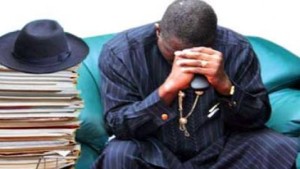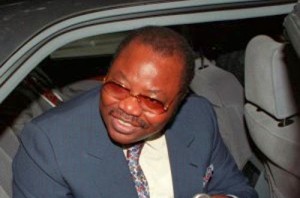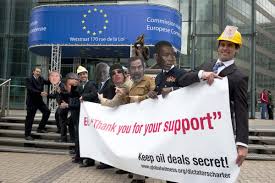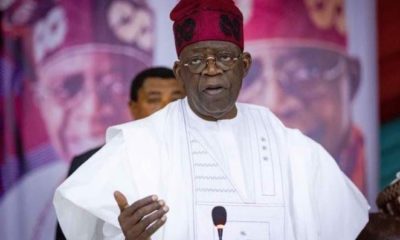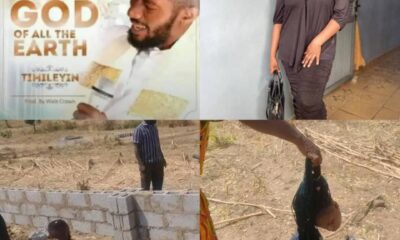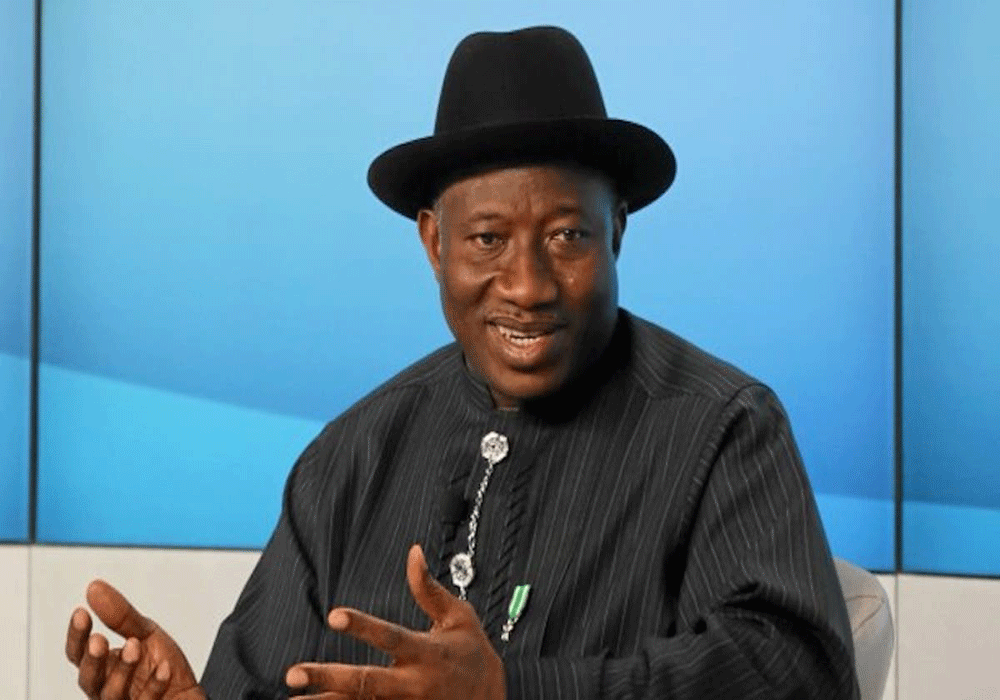Finance
$1.1billion Fraud: British Judge questions Jonathan’s integrity, stops Etete from getting N17 billion
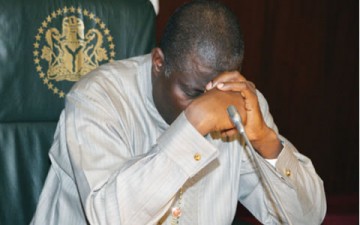
LONDON-A British Judge on Tuesday refused to release $85 million (N17 billion) to Malabu, a fraudulent company controlled by Nigeria’s former petroleum minister, Dan Etete.
In refusing to release the money to Malabu, Justice Edis of the Southwark Crown Court declared that he was not sure the administration of President Goodluck Jonathan acted in Nigeria’s interest when it approved the transfer of the money to Malabu.
“I cannot simply assume that the FGN which was in power in 2011 and subsequently until 2015 rigorously defended the public interest of the people of Nigeria in all respects,” the judge ruled.
PREMIUM TIMES had reported how the Jonathan administration controversially approved the transfer of $1.092 billion from Nigeria’s JP Morgan account in London to Nigerian accounts controlled by Malabu.
The money was paid by global oil giants, Shell and ENi, for Africa’s richest oil bloc, OPL 245.
The former Attorney General of the Federation, Mohammed Adoke, and the former Minister of State for Finance, Yerima Ngama, signed the documents approving the transfer to Malabu.
The fraudulent deal, shaded in various layers of corruption, has been condemned by Nigerians and international transparency advocates and is being investigated by authorities in four different countries.
The seized $85 million
The $85 million was seized at the request of Italian prosecutors who are also investigating the deal. The money was the last part of the OPL 245 largesse not yet distributed.
Sensing that the Muhammadu Buhari administration was yet to find its feet on international legal matters, Mr. Etete approached the British court and asked that the money be returned to him.
At a two-day hearing that started on November 23, Mr. Etete’s lawyers argued that there was no fraud in the deal and asked that the money be released to him.
While Mr. Etete argued that the money be released to him, the Italian prosecutor argued that “their investigation could lead to a potential forfeiture of the money down the road.” a source who has followed the case and was present at the proceedings told PREMIUM TIMES.
Malabu’s lawyers told the court that freezing the money was an assault on Nigeria and questioned how the court could imagine that Messrs. Adoke and Ngama would be a party to a corrupt deal.
The ruling
While giving his ruling on Tuesday, Justice Edis said while he could not say for certain if the deal was fraudulent pending conclusions of investigations, it would be inappropriate to release the money to Malabu.
“I am not making any findings of fact about misconduct by anyone. I am simply assessing the evidence before me to determine whether a restraint order should be discharged which was granted by way of MLA (Mutual Legal Assistance between the UK and Italy) to support an investigation by the Italian authorities,” the judge said.
The judge also made reference to evidence provided by the Italian authorities that ex-President Jonathan was directly involved in the fraudulent deal.
“The suggestion from the wiretaps is that “Fortunato” was implicated and I am told that this was a reference in code (not subtle) to the former President of Nigeria, President Goodluck Jonathan,” the judge said.
“Aliyu (Abubakar) is said to be associated with him and Aliyu received, in a way which was not transparent, $523m of the money paid for the OPL 245 licence in August 2011.”
PREMIUM TIMES had reported how fictitious companies owned by Abubakar Aliyu, a man referred to as ‘Mr. Corruption’ by anti-graft officials, received over half ($532 million) of the total $1.092 billion.
Mr. Aliyu, a close ally of Mr. Jonathan was recently quizzed by EFCC operatives for the first time despite being a central character in the deal whose investigation was virtually stalled during the Jonathan presidency.
Activists react
Reacting to the ruling, Simon Taylor of Global Witness stated that “Given the gathering pace of the EFCC investigation in Nigeria under new leadership and a call by the Nigerian House of Representatives to cancel the deal in 2014, investors in Shell and Eni should demand to know why they were exposed to such risk.”
The UK based Global Witness has been at the forefront of the demand for transparency in the deal and other similar deals across the world.
Also reacting to the judgement, Dotun Oloko, an anti-corruption campaigner in Nigeria said, “In light of these allegations in a UK court, the role of the senior Nigerian officials involved in this deal, including Goodluck Jonathan, must now be fully investigated.”
With the ruling, Nigerian now has the opportunity to not only claim the money but also another $110.5 million of the funds held in a Swiss bank while investigations continue.
Below is a statement by Global Witness after the court ruling:
Court refuses to unfreeze funds from “smash and grab” raid on Nigerian oil block
Prosecutors allege that “fronts for President Goodluck Jonathan of Nigeria” received US$523m in proceeds of “smash and grab” OPL 245 deal
Southwark Crown Court today rejected an attempt by a company owned by the former Nigerian oil minister Dan Etete to unfreeze US$85m in proceeds of the corrupt deal for the Nigerian offshore oil block, Oil Prospecting Licence 245 (OPL 245), which was sold to Shell and Eni for $1.1bn in 2011.
The funds were restrained at the request of Italian authorities, who are investigating the sale of the block by Malabu Oil & Gas, a company secretly owned by Mr Etete, to the international oil companies.
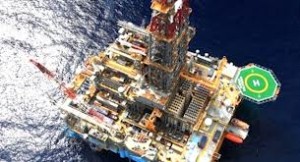 The Federal Government of Nigeria (FGN) under Goodluck Jonthan acted as a middleman in the deal, and the court received evidence based on wiretaps that prosecutors allege show that the then President, Goodluck Jonathan, was directly involved. The deal deprived the Nigerian people of a sum equivalent to 80% of the country’s 2015 health budget.
The Federal Government of Nigeria (FGN) under Goodluck Jonthan acted as a middleman in the deal, and the court received evidence based on wiretaps that prosecutors allege show that the then President, Goodluck Jonathan, was directly involved. The deal deprived the Nigerian people of a sum equivalent to 80% of the country’s 2015 health budget.
“In light of these allegations in a UK court the role of the senior Nigerian officials involved in this deal including Goodluck Jonathan must now be fully investigated,” said Dotun Oloko, a Nigerian anti-corruption campaigner.
Evidence from US authorities presented to the court and included in the judgement “shows payments following circuitous routes which total $523m and which arrived at Abubakar Aliyu, aka ‘Mr Corruption’” […] “Aliyu’s companies are allegedly fronts for President Goodluck Jonathan of Nigeria”. The Crown Prosecution Service, acting at the behest of the Public Prosecutor for Milan (PPM), described OPL 245 as a case of “grand corruption”.
The OPL 245 deal is currently under investigation by the Public Prosecutor of Milan, the UK’s National Crime Agency (NCA), and the Nigerian Economic and Financial Crimes Commission (EFCC). The EFCC have reportedly recently interviewed Abubakar Aliyu in connection with the case, and earlier this year interviewed Dan Etete.
Justice Edis of Southwark Crown Court turned down Malabu’s application to discharge the freezing order rejecting Malabu’s arguments that the Crown had failed to follow proper procedures in securing the freezing. Justice Edis concluded in his judgement:
It is extremely important that what I am about to say is not misunderstood. I am not making any findings of fact about misconduct by anyone. I am simply assessing the evidence before me to determine whether a restraint order should be discharged which was granted by way of MLA to support an investigation by the Italian authorities. That investigation is not complete (and appears to be still at quite an early stage). What misconduct it may ultimately prove, if any, will be a matter for the PPM and the Italian court if proceedings are brought.
However, precisely because I cannot reach firm factual conclusions, I cannot simply assume that the FGN which was in power in 2011 and subsequently until 2015 rigorously defended the public interest of the people of Nigeria in all respects. Mr. Fisher QC who appeared for the CPS used the phrase “grand corruption” to describe the form of corruption in which the state itself is culpable.
The suggestion from the wiretaps is that “Fortunato” was implicated and I am told that this was a reference in code (not subtle) to the former President of Nigeria, President Goodluck Jonathan. Aliyu is said to be associated with him and Aliyu received, in a way which was not transparent, $523m of the money paid for the OPL 245 licence in August 2011.
“Given the gathering pace of the EFCC investigation in Nigeria under new leadership and a call by the Nigerian House of Representatives to cancel the deal in 2014, investors in Shell and Eni should demand to know why they were exposed to such risk,“ said Simon Taylor, a Director of Global Witness.
Suspects named in the Italian case include Eni and its current and former CEOs Claudio Descalzi and Paolo Scaroni, as well the company’s Chief Development, Operations & Technology Officer Roberto Casula and former executive Vicenzo Armanna. Other suspects in the Italian case include Dan Etete and middlemen Emeka Obi, Gianluca Di Nardo and Luigi Bisignani. Shell and Eni have denied any wrongdoing.
“It is clear from evidence in the public domain that high level executives in Shell personally took part in negotiating this deal. Citizens in the UK, US, Netherlands and Nigeria should demand that Shell and its executives are investigated in their respective countries,” said Nicholas Hildyard of The Corner House.
Shell and Eni have invested at least $1.8bn in purchasing and developing the block, which they own 50-50. It reportedly holds probable reserves of 9.23 billion barrels of oil, which if proven, would represent the equivalent of a third of Shell’s proven reserves, and two thirds of Eni’s.
Antonio Tricarico of Re:Common said: “$85 million paid by Eni and Shell for the benefit of Dan Etete’s company Malabu remains frozen in London. The time has come that Eni and Shell come clean about what they knew about this deal and who else this money was intended for.”
Premium Times-
Business
Nigeria pays US$4.9 billion on petrol subsidy in 2024- NNPCL
It was however noted by Biztellers.com.ng, that although subsidy is back in effect, the main reason for that is the increasingly weak state of the Naira and the country’s extreme dependence on products importation. Also unlike the previous subsidy era, where several oil marketers were getting free subsidy refunds for unverified product importation, this subsidy era is witnessing only one importer, the NNPCL, which in effect is the sole receiver of government subsidies.
Yemie ADEOYE
INSPITE of the official position of the Nigerian government that the controversial petrol subsidy is gone for good as announced by the President on assumption of office, the state owned Nigerian National Petroleum Corporation Limited, NNPCL has disclosed that petrol subsidy is still fully operational in Nigeria, although, under a different identity.
Umar Ajiya, Chief Financial Officer at the NNPCL, disclosed that it cost the company a staggering N7.8 trillion (US$4.9) to cover this price gap in the first seven months of 2024.
Rather than simply referring to these claims as subsidies, he stated that the company is merely managing the price difference in petrol imports on behalf of the federation, stressing that this should not be misconstrued as a return to subsidy payments.
![]() This revelation has reignited discussions on whether the NNPC is indirectly offering subsidies, a concept typically defined as selling a product below its cost price.
This revelation has reignited discussions on whether the NNPC is indirectly offering subsidies, a concept typically defined as selling a product below its cost price.
Documents reviewed by Biztellers.com.ng showed that the term “subsidy” was used extensively in official correspondence between the NNPCL and the presidency, particularly in reference to the “shortfall.”
Recall that President Bola Tinubu reportedly approved NNPC’s request to utilize the 2023 final dividends due to the federation to offset these costs.
However, during a media briefing on Monday about the company’s 2023 audited financial statements, Ajiya refuted claims that the NNPC is involved in any subsidy scheme.
Ajiya further disclosed that the Nigerian government owes the NNPC N7.8 trillion ($4.9 billion) in subsidy-related debts for the period from January to July 2024.
In furtherance of his clarification to the News Agency of Nigeria (NAN), Ajiya insisted that no subsidy payments have been made to any marketer in the last nine years, citing the NNPC’s role as the sole importer of petrol under supply contracts.
He said, “In the last eight to nine years, NNPC Ltd. has not paid anyone a dime as a subsidy; no kobo has been disbursed by NNPC Ltd. in the name of subsidy. No marketer has received any payment from us for subsidy.”
“What has been happening is that we have been importing PMS, which has been landing at a specific cost price, and the government tells us to sell it at half price. So the difference between the landing price and that half price is a shortfall.
“And the deal is between the Federation and NNPC Ltd., to reconcile, sometimes they give us money, so there is no money exchanging hands with any marketer in the name of subsidy.”
Ajiya remained silent on how much of the $4.9 billion could have been remitted to the federation account if the NNPC had not been covering the “shortfall.”
It was however noted by Biztellers.com.ng, that although subsidy is back in effect, the main reason for that is the increasingly weak state of the Naira and the country’s extreme dependence on products importation. Also unlike the previous subsidy era, where several oil marketers were getting free subsidy refunds for unverified product importation, this subsidy era is witnessing only one importer, the NNPCL, which in effect is the sole receiver of government subsidies.
Banking
CBN Denies Currency Devaluation

The Central Bank of Nigeria (CBN) has refuted claims of devaluing the.
Earlier reports suggested that the CBN had devalued the Naira, lowering its exchange rate from N631 to the dollar, compared to the previous day’s rate of N461.60 at the Importers and Exporters (I&E) window.
However, the Central Bank of Nigeria (CBN) released a statement on Thursday through its Acting Head of Corporate Communications, Dr. Isa Abdulmumin, categorizing the report as false information.
In the statement titled ‘CBN Has Not Devalued The Naira’, he said the attention of the apex bank was drawn to the news report by an Abuja based newspaper edition of June 1, 2023, titled “CB Devalues Naira To 630/51”.
However, the CBN stated categorically that the news report was replete with outright FALSEHOODS and destabilizing innuendos, ‘reflecting potentially willful ignorance of the said medium as to the workings of the Nigerian Foreign Exchange Market.’
“For the avoidance of doubt, the exchange rate at the Investors’ & Exporters (I&E) window traded this morning (June 1, 2023) at N465/USS1 and has been stable around this rate for a while.
“The public is hereby advised to ignore the news report by Daily Trust in its entirety, as it is speculative and calculated at causing panic in the market,” the CBN spokesman added.
He, therefore, advised media practitioners to verify their facts from the Central Bank of Nigeria before publishing in order not to misinform the public.
Banking
BREAKING: CBN Increases Interest Rate By 0.5%

The interest rate in Nigeria has been raised to 18.5 percent, up by 0.5 percent, from 18 percent where it was pegged in March 2023.
The Central Banks of Nigeria’s (CBN) Monetary Policy Committee (MPC) resolved to this effect at its third meeting of 2023 in Abuja, on Wednesday.
Governor, CBN, Godwin Emefiele, made the disclosure in the communiqué of the MPC’s meeting, thereafter.
While engaging the media at the end of the two-day meeting, Emefiele, said the committee voted to keep the asymmetric corridor at +100 and -700 basis points around the MPR.
In the view of the MPC, rising inflation rate is traceable to the high energy cost and challenges around the supply chain, among others, which lie outside the corridors of the CBN.
Emefiele said, “The current trend in price development would continue to be monitored by the bank with greater collaboration with fiscal authority to address the drivers of inflation.”
Biztellers reports that the CBN had effected six consecutive interest rate increases, which has seen the rate move from 11.5 percent in March 2022 to 18.5 percent in May 2023.

